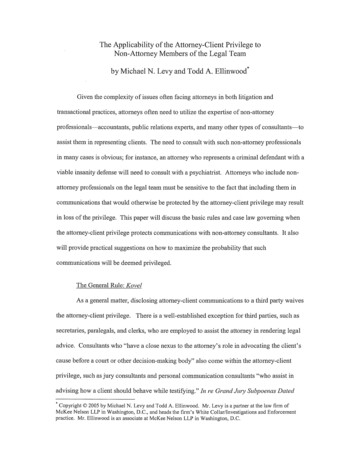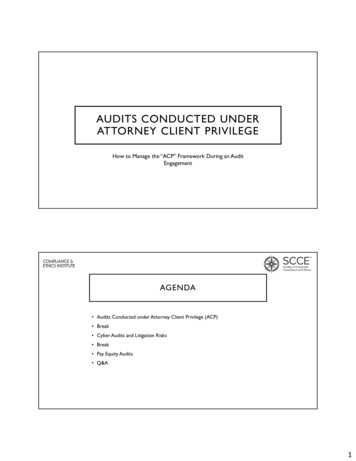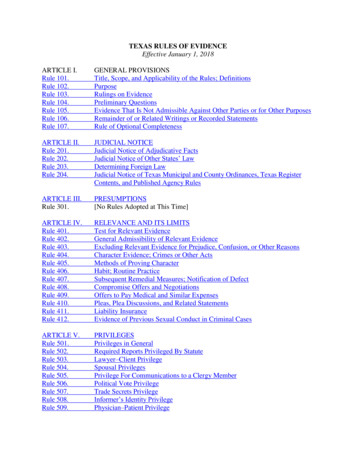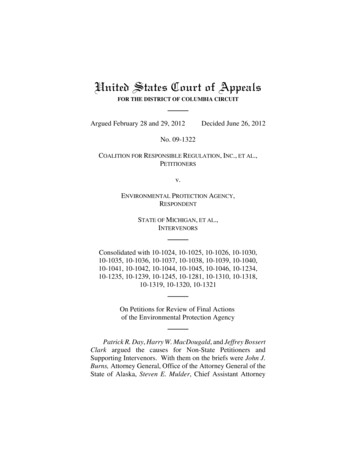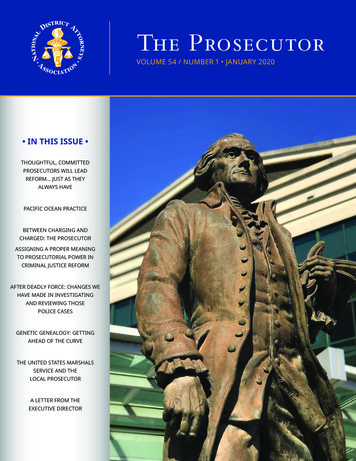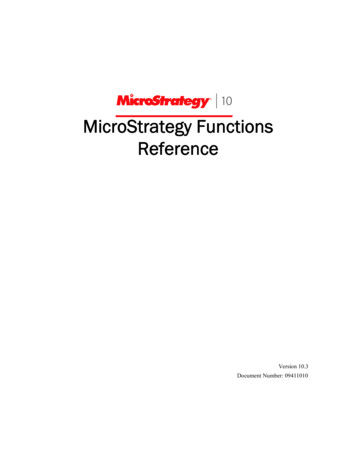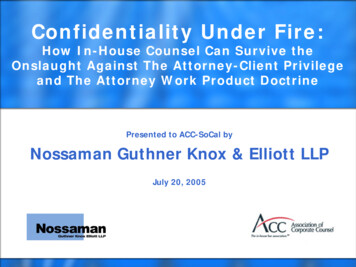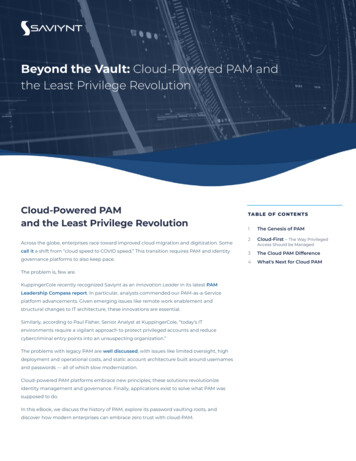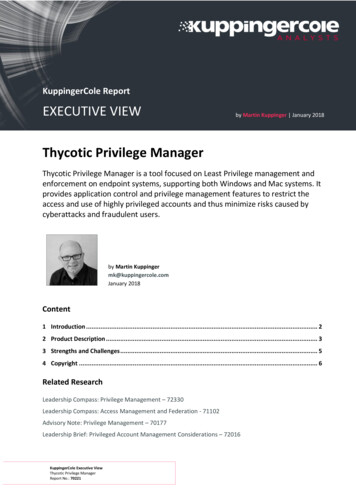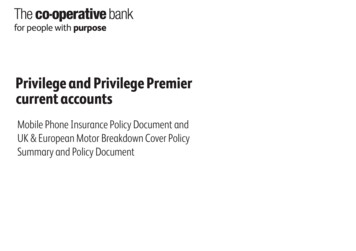
Transcription
Presenting a live 90-minute webinar with interactive Q&AThird-Party Attorney-Client Privilege WaiverExceptions: Kovel, Common Interest andFunctional Equivalent DoctrinesWEDNESDAY, OCTOBER 18, 20171pm Eastern 12pm Central 11am Mountain 10am PacificToday’s faculty features:Donna L. Fisher, Partner, Pepper Hamilton, Harrisburg, Pa.Brian C. Spahn, Shareholder, Godfrey & Kahn, MilwaukeeThe audio portion of the conference may be accessed via the telephone or by using your computer'sspeakers. Please refer to the instructions emailed to registrants for additional information. If youhave any questions, please contact Customer Service at 1-800-926-7926 ext. 10.
Tips for Optimal QualityFOR LIVE EVENT ONLYSound QualityIf you are listening via your computer speakers, please note that the qualityof your sound will vary depending on the speed and quality of your internetconnection.If the sound quality is not satisfactory, you may listen via the phone: dial1-866-869-6667 and enter your PIN when prompted. Otherwise, pleasesend us a chat or e-mail sound@straffordpub.com immediately so we canaddress the problem.If you dialed in and have any difficulties during the call, press *0 for assistance.Viewing QualityTo maximize your screen, press the F11 key on your keyboard. To exit full screen,press the F11 key again.
Continuing Education CreditsFOR LIVE EVENT ONLYIn order for us to process your continuing education credit, you must confirm yourparticipation in this webinar by completing and submitting the AttendanceAffirmation/Evaluation after the webinar.A link to the Attendance Affirmation/Evaluation will be in the thank you emailthat you will receive immediately following the program.For additional information about continuing education, call us at 1-800-926-7926ext. 35.
Program MaterialsFOR LIVE EVENT ONLYIf you have not printed the conference materials for this program, pleasecomplete the following steps: Click on the symbol next to “Conference Materials” in the middle of the lefthand column on your screen. Click on the tab labeled “Handouts” that appears, and there you will see aPDF of the slides for today's program. Double click on the PDF and a separate page will open. Print the slides by clicking on the printer icon.
Third Party Attorney-ClientPrivilege Waiver Exceptions: Kovel,Functional Equivalent andCommon Interest DoctrinesDonna L. Fisher, Esq.Pepper Hamilton LLPfisherd@pepperlaw.comOctober 18, 2017Brian C. Spahn, Esq.Godfrey & Kahn S.C.bspahn@gklaw.com
Table of ContentsI.II.III.IV.V.Overview – Attorney-Client Privilege; Attorney Work-ProductDoctrine; and WaiverExceptions to Third-Party Waivers – Kovel Doctrine;Functional Equivalent Doctrine; Common Interest DoctrineCase DiscussionsBest Practices/Lessons LearnedQ&A6
Part I: OverviewAttorney-Client PrivilegeB. Attorney Work-Product DoctrineC. WaiverA.7
A. Attorney-Client Privilege Generally:- The person or entity asserting the privilege must be aclient;- The person to whom the communication was made mustbe an attorney acting in that capacity at the time of thecommunication;- The communication must have been made by the client,not a third party;- The communication must be made in confidence; and- The communication must be for the purposes of obtaininglegal advice or assistance in a legal proceeding. States, federal and foreign systems each have their ownparticular law on the attorney-client privilege (i.e., protection inone jurisdiction does not mean protection in anotherjurisdiction).8
B. Attorney Work-Product Doctrine The work-product doctrine is a qualified immunity from thediscovery of an attorney’s written statements, privatememoranda and personal recollections that are made inanticipation of litigation. The immunity is qualified in that it is subject to discovery bythe opposing party upon a special showing of undue hardshipor injustice. Attorney opinions made in anticipation of litigation are neversubject to discovery.9
C. Waiver The attorney-client privilege is waived when thecommunication is made in the presence of, or communicatedto, a third party. “The widely applied standard for determining the scope of awaiver of attorney-client privilege is that the waiver applies toall other communications relating to the same subject matter.”Fort James Corp. v. Solo Cup Co., 412 F.3d 1340, 1349 (Fed.Cir. 2005). FRE 502(a) – When the disclosure is made in a federalproceeding or to a federal office or agency and waives theattorney-client privilege or work-product protection, the waiverextends to an undisclosed communication or information in afederal or state proceeding only if:10
Waiver (cont’d)1) The waiver is intentional;2) The disclosed and undisclosed communications or informationconcern the same subject matter; and3) They ought in fairness to be considered together.11
Part II: Exceptions to Third-Party WaiversKovel DoctrineB. Functional Equivalent DoctrineC. Common Interest DoctrineA.12
A. Kovel Doctrine - United States v. Kovel, 296F.2d 918 (2nd Cir. 1961) Accountants- Theme: serving as “interpreters” – analogy that theaccountant is facilitating communications betweenattorney and a non-English speaking client- Elements Communication between attorney and an accountantmust be “made in confidence for the purpose ofobtaining legal advice from the lawyer.” 296 F.2d at922. Predominant purpose test. Distinguishing betweenlegal work and accounting work. The “presence of the accountant is necessary, or atleast highly useful, for the effective consultationbetween the client and lawyer which the privilege isdesigned to permit.” Id.13
Application of Kovel Doctrine to Other ThirdParty Consultants Communications with other third party consultants may still beprivileged as long as the consulting service is rendered forlegal rather than business advice.- Communications with the consultant must be keptconfidential.- However, reports or statements made by or to theconsultant without an attorney’s direction or supervision arepresumably made in the ordinary course of business and soare not privileged. Translation analogy still applies – the consultant must betranslating information or facilitating the communicationbetween the lawyer and client so that the lawyer can renderlegal advice. See also Fed. R. Civ. P. 26(b)(4)(B) and (C).- In federal courts, draft expert reports and certain attorneyexpert communications are protected as work-product.14
B. Functional Equivalent Doctrine Protects communications between organizations and nonemployees who are the “functional equivalent” of employees. Factors that courts consider in applying the test:- Whether the consultant had primary responsibility for a keycorporate job.- Whether there was a continuous and close workingrelationship between the consultant and the company’sprincipals on issues interrelated with legal issues.- Whether the consultant is likely to possess informationunique to anyone else at the company.15
Functional Equivalent Doctrine (cont’d) Courts disagree over the evidence necessary to meet thefunctional equivalence doctrine. Courts also disagree whether the “functional equivalence test”is in lieu of, or in addition to, the “necessity test” to determinewhether the attorney client privilege protects thesecommunications. See, e.g., Viacom, Inc. v. Sumitomo Corp.(In re Copper Mkt. Antitrust Litig.), 200 F.R.D. 213 (S.D.N.Y.2001)16
C. Common Interest Doctrine AKA –- “Community of interest” rule; “Co-client” privilege; “Jointprosecution” privilege; “Joint defense” privilege.“The joint defense privilege was adopted as an exception to[the] waiver rule, under which communications between aclient and his own lawyer remain protected by the attorneyclient privilege when disclosed to co-defendants or theircounsel for purposes of a common defense.” United States v.Stepney, 246 F. Supp. 2d 1069, 1075 (N.D. Cal. 2003). Courts now recognize the doctrine as also applying to partiesin civil litigation. Generally speaking, the common interest doctrine applieswhen the parties – 1) share a common interest; 2) thecommunication is confidential; 3) the communication is infurtherance of the common legal interest; and 4) thecommunication is related to pending or reasonably anticipatedlitigation.17
Common Interest Doctrine (cont’d) Courts have applied the Common Interest Doctrineinconsistently.- Hard line test requires that the parties’ “common interest” isnearly “identical.” More flexible test requires that the parties’“common interest” must be closely aligned. Jurisdictions also differ as to whether litigation is necessary toinvoke the common interest doctrine or whether the doctrinealso applies in the transaction context.18
Part III: Case Discussion19
United States v. Chevron Texaco Corp.,241 F. Supp. 2d 1065 (N.D. Cal. 2002) Defendant sought advice from Price Waterhouse on thestructure of a transaction.Defendant’s legal department discussed structure, purposeand tax consequences of transaction.Defendant, relying on Kovel, withheld documents exchangedas privileged.Magistrate judge distinguished between an accountant beinghired merely to give additional legal advice about complyingwith the tax code from being hired to assist in understandingfinancial information.Recommended the court hold that Kovel only applied if theconsultation with the third party was necessary to effectuatelegal advice.20
Calvin Klein Trademark Trust v. Wachner, 198F.R.D. 53 (S.D.N.Y. 2000)In anticipation of filing a lawsuit, plaintiff’s counsel retained PRconsultant for certain communications services in connectionwith the law firm’s representation of plaintiff. At the time, PR firm was already working directly for plaintiff. Defendant sought communications between PR firm andplaintiff. After in camera review, Court held most of thecorrespondence was not protected by the attorney-clientprivilege: - Few were made for the purpose of obtaining legal advice.- PR firm was providing ordinary public relations advice.- PR firm was not performing functions materially different fromthose that any ordinary PR firm would have performed. Court distinguished between strategizing about the conduct oflitigation from the effects of the litigation on customers, themedia, or the public.21
In re Copper Mkt. Antitrust Litig.,200 F.R.D. 213 (S.D.N.Y. 2001) Foreign corporation was embroiled in high profile scandalinvolving both regulatory and civil litigation aspects. Corporation had no experience with publicity issues in highprofile cases. Further, only 2 of 3 executives in corporation’scommunications department spoke English and theirlanguage skills were not sufficient for media relations. Corporation hired PR firm to assist with media relations inconnection with the scandal and litigation. PR firm conferred frequently with the corporation’s U.S.litigation counsel and general counsel in preparing pressreleases and other materials which incorporated the lawyers’advice.22
In re Copper Mkt. Antitrust Litig.,200 F.R.D. 213 (S.D.N.Y. 2001) (cont’d) Court held that the PR firm was the functional equivalent ofthe corporation’s employee. The Court rejected the argument that third party consultantscame within the scope of the privilege only when acting asconduits or facilitators of attorney-client communications:- [I]n this case, RLM is the functional equivalent of aSumitomo employee. Accordingly, the analysis set forth inKovel and its progeny concerning whether the privilegeapplies to communications made to third parties for thepurpose of facilitating attorney-client communications isinapposite.200 F.R.D. at 220.23
In re Grand Jury Subpoenas Dated March 24,2003, 265 F. Supp. 2d 321 (S.D.N.Y. 2003) Target of grand jury investigation hired a PR firm to assist ininfluencing the outcome of the investigation. Government subpoenaed the PR firm to produce documentsand to testify before the grand jury regarding communicationswith the target. PR firm asserted the attorney-client privilege on behalf of thetarget, arguing that the purpose of its public relationscampaign was to counter unbalanced and inaccurate pressreports about the target. Court upheld the assertion of privilege:- “[T]he ability of lawyers to perform some of their mostfundamental client functions would be undermined seriously iflawyers were not able to engage in frank discussion of facts andstrategies with the lawyers’ public relations consultants.”265 F.Supp. 2d at 330.24
In re Grand Jury Subpoenas Dated March 24, 2003,265 F. Supp. 2d 321 (S.D.N.Y. 2003) (cont’d) Court explicitly stated that target would not have enjoyed anyprivilege for her own communications with PR firm if she hadhired firm directly. Court held communications between target and PR firmwithout the attorney may also be privileged but carved out twoconversations between target and PR firm without law firm,determining neither were made for purpose of obtaining legalservices.25
Grand Canyon Skywalk Dev. LLC v. Cieslak, 2015U.S. Dist. LEXIS 107457 (D. Nev. Aug. 13, 2015) Plaintiffs alleged that the PR firm and individual members ofthe Tribal Council conspired to conduct a public relationscampaign to accuse plaintiffs of having breached theircontracts with the Tribe.Alleged purpose of conspiracy was to gain support for theTribe’s enactment of an eminent domain ordinance andsubsequent condemnation of plaintiffs’ contractual rights.The individual tribal members asserted affirmative defensethat they had acted in good faith upon advice of counsel.Plaintiffs sought to depose Tribe’s attorney relating to hiscommunications with the PR firm.Tribe’s law firm stated that as part of its representation ofTribe, it had recommended that the Tribe hire PR firm tomanage media contacts relating to the litigation.26
Grand Canyon Skywalk Dev. LLC v. Cieslak, 2015U.S. Dist. LEXIS 107457 (D. Nev. Aug. 13, 2015) (cont’d) Court upheld the assertion of privilege, holding that the PRfirm should be treated as the functional equivalent of anemployee of the Tribe. Court noted:- PR firm was hired by the Tribe, through its counsel, toprotect the name of the Tribe and make it look morereasonable.- The law firm reviewed and approved agreement betweenTribe and PR firm.- PR firm did not undertake to provide general PR servicesto the Tribe beyond the legal dispute with plaintiffs.27
Scott v. Chipotle Mexican Grill, Inc.,94 F. Supp. 3d 585 (S.D.N.Y. 2015) Action involved violations of the Fair Labor Standards Act andclass action claims under the New York Minimum Wage Act.The defendant had reached out to its legal counsel for adviceon the classification of apprentices.After counsel had provided legal advice on the classificationquestion, defendant retained a human resources consultantto conduct a “job function analysis.” 94 F.Supp. 3d at 592.Defendant produced some of consultant’s interview noteswithout asserting privilege objection.Results/conclusions of job function analysis werecommunicated in memorandum to counsel, which defendantwithheld as privileged.28
Scott v. Chipotle Mexican Grill, Inc.,94 F. Supp. 3d 585 (S.D.N.Y. 2015) (cont’d) Court held the attorney-client privilege did not protect thememorandum:- Report did not provide any specialized knowledge that theattorney could not have acquired or understood on his/herown.- None of the communications between HR consultant andemployees were designated privileged.- Defendant’s own HR team could have easily performedthe analysis.- Legal counsel did not use the HR memorandum to renderlegal advice as the law firm’s legal advice was providedbefore receiving HR memorandum.29
BouSamra v. Excela Health,2017 PA Super 235 (Pa. Super. 2017) Plaintiff and another physician held staff privileges atdefendant’s facility. During the course of a peer review,Defendant discovered that the physicians providedunnecessary treatments. Defendant hired outside counsel to advise it regardingdisclosing physicians’ names. Outside counsel wrote anopinion letter. Defendant retained a public relations firm to advise it onpotential public statements about the physicians andforwarded the legal analysis to the PR firm. After defendant publicly disclosed the physicians’ names,plaintiff sued. In discovery, plaintiff sought outside counsel’sopinion and related emails.30
BouSamra v. Excela Health,2017 PA Super 235 (Pa. Super. 2017) (cont’d) Court held PR firm input was not required in order for outsidecounsel to provide legal advice:- PR firm not involved in the legal issue in question.- PR firm provided no input into that decision.- Outside counsel never communicated with PR firm. Court also held PR firm was not functional equivalent of anemployee:- Defendant had a staffed PR department.- PR firm was hired for crisis management on discreteassignments.- PR firm controlled staffing and methodology of its projects. Court also held work-product privilege did not protect the legalopinion sent to the PR firm because the opinion was not sentto help outside counsel in preparing for litigation.31
Behunin v. Superior Court, 9 Cal.App.5th833, 215 Cal.Rptr.3d 475 (App. 2d Dist. 2017) Lawsuit by plaintiff against the defendant family involving anunsuccessful business deal. To induce settlement, Behunin’s attorney hired a PR firm tocreate a social media campaign to induce the Schwab familyto settle. The Schwabs sued for defamation and invasion of privacyand requested information exchanged between Behunin,Behunin’s attorney and the PR firm. Court held Behunin had not proven the communications werereasonably necessary for counsel’s representation anddetermined the information was not privileged.32
Endeavor Energy Res. v. Gatto & Reitz, No. 2:13CV542,2017 U.S. Dist. LEXIS 48715 (W.D. Pa. 2017) Plaintiff filed a claim against defendant alleging improperdistribution of funds held in escrow. In discovery, defendant sought deposition responses from,and documents provided to, a “contract landman” hired byplaintiff as an independent contractor. Court cited In re Flonase Antitrust Litigation, 879 F. Supp. 2d454, 460 (E.D. Pa. 2012)(citations omitted):- Extending the privilege to a consultant performing a role similarto that of an employee, to the same extent as it applies to acorporate employee, simply ‘reflects the reality that “corporationsincreasingly conduct their business not merely through regularemployees but also through a variety of independent contractorsretained for specific purposes.”’2017 U.S. Dist. LEXIS 48715, at *17-18.33
Endeavor Energy Res. v. Gatto & Reitz, No. 2:13CV542,2017 U.S. Dist. LEXIS 48715 (W.D. Pa. 2017) (cont’d)Court held that the contract landman “easily qualifies” as thefunctional equivalent of an employee. 2017 U.S. Dist. LEXIS48715, *24-25. Interesting facts:- Landman testified he was not plaintiff’s agent, that heconsidered himself a contractor.- Landman did not communicate directly with counsel buttestified that he knew the information plaintiff was givinghim had been discussed with counsel.- Court noted landman was routinely performing same typeof work as plaintiff’s employees. 34
Supreme Forest Products, Inc. et al. v. Kennedy et al, No.3:16CV54, 2017 WL 120644 (D. Conn. Jan. 12, 2017) Company and two of its employees brought suit against twoformer employees for unlawfully tape recording conversationsthat the former employees used to bring workplace safetylawsuits against company. Two defendants were represented in the lawsuit by the sameattorney who had brought the two separate workplace safetylawsuits previously. Defendants invoked attorney-client privilege relating tomeetings and communications that they jointly participated inwith their attorney during the prior lawsuit. Issue was whether the privilege applied to jointcommunications between defendants and their attorney beforethe current lawsuit was filed.35
Supreme Forest Products, Inc. et al. v. Kennedy et al, No.3:16CV54, 2017 WL 120644 (D. Conn. Jan. 12, 2017) (cont’d) Court ruled that the fact that attorney filed separate lawsuitsrather than joining both former employees did not dispel theapplication of the co-client privilege. Company argued that common interest privilege did not applybecause defendants’ interest must be identical, not merelysimilar. Court distinguished between “community of interest” doctrinein which some courts have held that parties’ interests must beidentical, and co-client privilege. Co-client privilege only requires “common” interest, not“identical” interest.36
Supreme Forest Products, Inc. et al. v. Kennedy et al, No.3:16CV54, 2017 WL 120644 (D. Conn. Jan. 12, 2017) (cont’d) Court also rejected argument that lack of joint representationagreement destroyed privilege because the defendants’“course of dealing” demonstrated a common interest. However, Court agreed with plaintiffs that underlying factswere not privileged and, therefore, to the extent that any factsor information were known to defendant without reference toprivileged communications, they were discoverable. Communications between defendants outside the presence ofcounsel were also discoverable and not privileged.37
Dresser-Rand Co. v. Schutte & Koerting AcquisitionCo. 242 F. Supp. 3d 576 (S.D. Tex. 2017) Company sued competitor and two former employees allegingmisappropriation of trade secrets. After filing lawsuit, plaintiff approached U.S. Attorney’s Officein an attempt to have that office initiate a criminal prosecutionof former employees. Plaintiffs voluntarily turned over a forensic expert’s report tothe federal prosecutors. Plaintiff then sought to withhold from discovery expert’s reportand correspondence with the prosecutors on the ground ofthe joint prosecution privilege.38
Dresser-Rand Co. v. Schutte & Koerting AcquisitionCo. 242 F. Supp. 3d 576 (S.D. Tex. 2017) (cont’d) Court recognized that work-product privilege protects thework-product of consulting experts. Court also noted that the joint prosecution privilege has beenfound to exist in the context of False Claims Act litigationwhere it has been inferred that a common interest existsbetween a FCA relator and the Government in prosecutingsuch claims. However, relying in-part on the sword-shield doctrine wherebythe privilege is waived when a party selectively presentscertain materials to an adversary to prove a point, the courtruled that no common interest existed between the civillitigants and a potential criminal prosecution. Because plaintiffs made a “calculated disclosure to further thegovernment’s inclination to prosecute” they waived anyprivilege attached to the information voluntarily divulged to thegovernment.39
Schaeffler v. United States, 806 F.3d 34 (2dCir. 2015) Company sought to restructure and refinance eleven-billionEuro loan agreement with a consortium of banks. In doing so,Company retained Ernst & Young to advise on federal taximplications and possible future litigation with IRS. IRS audited the company and sought E&Y work-product. District court ruled that company waived attorney-clientprivilege by sharing E&Y analysis with the consortium ofbanks because the banks’ interest was commercial ratherthan legal. Second Circuit reversed.40
Schaeffler v. United States, 806 F.3d 34 (2dCir. 2015) (cont’d)Second Circuit held that the banks’ common interest with thecompany was of a sufficient legal character to prevent waiverby sharing communications.- “[I]t is unnecessary that there be actual litigation inprogress for the common interest rule of the attorney-clientprivilege to apply.” 806 F.3d at 40.- “The communications regarding tax opinions were ‘made in the course of an ongoing common enterprise’ and‘intended to further the enterprise.’” Id. at 42. Parties may share a “common interest” even if they are notparties in ongoing litigation. 41
Schaeffler v. United States, 806 F.3d 34 (2dCir. 2015) (cont’d) Second Circuit also ruled that work-product doctrine appliedto E&Y tax advice memorandum because it “was specificallyaimed at addressing the urgent circumstances arising fromthe need for a refinancing and restructuring and wasnecessarily geared to an anticipated audit and subsequentlitigation, which was on this record highly likely.” Id. at 44.42
In re Santa Fe Int’l Corp, 272 F.3d 705 (5thCir. 2001)Companies’ in-house counsel shared opinion letter with eachother regarding potential antitrust exposure years beforeantitrust litigation was filed. Fifth Circuit noted that there are two types of communicationsprotected under the common interest doctrine – “(1)communications between co-defendants in actual litigationand their counsel;” and “(2) communications betweenpotential co-defendants and their counsel.” 272 F.3d at 710(citations omitted).- Court noted that “potential” had not been clearly defined. 43
In re Santa Fe Int’l Corp, 272 F.3d 705 (5thCir. 2001) (cont’d) Therefore, unlike the Second Circuit decision in Schaeffler,the Fifth Circuit held that because the privilege is “an obstacleto truth seeking,” it must “be construed narrowly to effectuatenecessary consultation between legal advisers and client.” Id. There must be a palpable threat of litigation at the time of thecommunication before the communication between onepossible future co-defendant and another can qualify asprivileged. Here, the Court noted that documents were circulated for thepurpose of ensuring compliance with the antitrust laws andminimizing risk. Documents were circulated in 1991 and the antitrust lawsuitwas not filed until 2000. Therefore, Fifth Circuit affirmedruling that litigation had not been anticipated at time ofdisclosure.44
Obeid v. La Mack, 2016 WL 7176653 (S.D.N.Y.Dec. 9, 2016) Plaintiffs regularly communicated with third-party investorabout the lawsuit and its impact on the third-party’sinvestment. Defendants sought communication betweenplaintiffs and third-party investor. Plaintiffs asserted commoninterest doctrine. Court held that communications were not for the purpose ofdeveloping a common legal strategy and, therefore, were notprotected under the common interest privilege.45
Obeid v. La Mack, 2016 WL 7176653 (S.D.N.Y.Dec. 9, 2016) (cont’d) It was not clear to the court that plaintiffs and investor hadformed a coordinated legal strategy:“More importantly, it does not seem plaintiff’scommunications with [the investor] were for the purposeof developing a common legal strategy. Although plaintiffclaims to have sought [the investor’s] opinion of and, insome cases, personal involvement in the litigationstrategy, he sought it because [the third-party] is aninvestor with an interest in seeing that the case issuccessful. Moreover, plaintiff admits that his precisereason in generating the Disputed Documents wasbecause the litigation materially affects [the investor’s]financial interest.” 2016 WL 7176653 at *8.46
Part IV: Best Practices/Lessons Learned Determine the applicable law, to extent possible. When retaining consultants, either in-house or outside counselshould initiate the engagement. The engagementletter/agreement should make explicit that the consultant isbeing retained to assist counsel in providing legal advice. Counsel should emphasize at the outset of each consultantengagement that all communications and documentsgenerated in the engagement should be consideredconfidential and only shared with individuals within thecompany who have a need for the information—and never witha third-party without approval of counsel.47
Best Practices/Lessons Learned (cont’d) In-house or outside counsel and the consultant mustregularly consult with each other about the engagement, andcounsel should oversee the consultant’s work. Simplyretaining outside counsel to engage the consultant is probablynot enough to ensure protection from subsequent discovery.Key meetings and communications should involve counsel. Counsel should be prepared to identify the specialized rolethat a consultant performed for the client and that that roleinvolved working closely with the lawyers. (Consultant is the“translator.”)48
Best Practices/Lessons Learned (cont’d) With respect to work-product, counsel must be mindful thatonly information prepared in anticipation of litigation will beprotected. The anticipated litigation should be easilyarticulated.With respect to the common interest doctrine, make sure the“common” interest is easily articulated. The parties’ interestsmust be closely aligned and, in some jurisdictions, identical.Make sure that each communication is made in the course of,and for the purpose of, furthering the common interest.Entering into a joint defense agreement may help but, in theend, the parties’ course of conduct will drive thedetermination.Information should only be shared among the lawyers, notthe clients49
The attorney-client privilege is waived when the communication is made in the presence of, or communicated to, a third party. "The widely applied standard for determining the scope of a waiver of attorney-client privilege is that the waiver applies to all other communications relating to the same subject matter."
